武汉大学英文介绍
- 格式:docx
- 大小:36.35 KB
- 文档页数:7
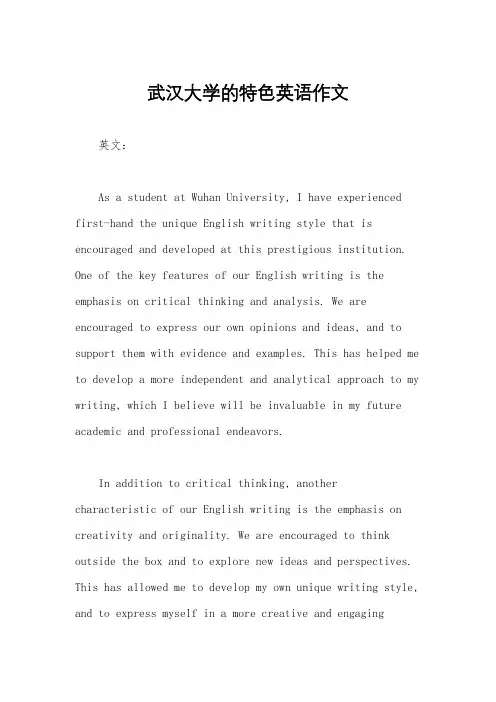
武汉大学的特色英语作文英文:As a student at Wuhan University, I have experienced first-hand the unique English writing style that is encouraged and developed at this prestigious institution. One of the key features of our English writing is the emphasis on critical thinking and analysis. We are encouraged to express our own opinions and ideas, and to support them with evidence and examples. This has helped me to develop a more independent and analytical approach to my writing, which I believe will be invaluable in my future academic and professional endeavors.In addition to critical thinking, anothercharacteristic of our English writing is the emphasis on creativity and originality. We are encouraged to think outside the box and to explore new ideas and perspectives. This has allowed me to develop my own unique writing style, and to express myself in a more creative and engagingmanner. For example, in a recent essay assignment, I was able to incorporate personal anecdotes and experiences to support my arguments, which added a personal touch to my writing and made it more relatable to the reader.Furthermore, the English writing at Wuhan University also places a strong emphasis on language proficiency and fluency. We are encouraged to expand our vocabulary, improve our grammar, and refine our language skills in order to communicate effectively and persuasively. This has helped me to become a more confident and articulate writer, and has enabled me to express my ideas with clarity and precision.Overall, the English writing at Wuhan University is characterized by its emphasis on critical thinking, creativity, and language proficiency. These features have not only helped me to become a better writer, but have also equipped me with the skills and confidence to communicate effectively in a global context.中文:作为武汉大学的学生,我亲身体验了这所学府鼓励和培养的独特英文写作风格。
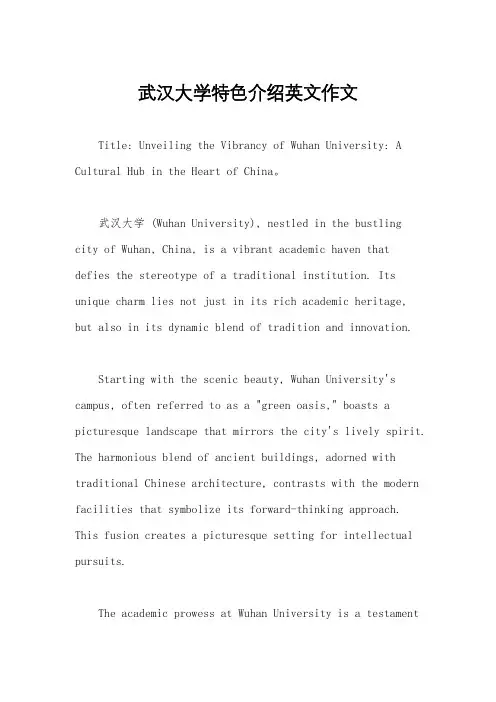
武汉大学特色介绍英文作文Title: Unveiling the Vibrancy of Wuhan University: A Cultural Hub in the Heart of China。
武汉大学 (Wuhan University), nestled in the bustlingcity of Wuhan, China, is a vibrant academic haven thatdefies the stereotype of a traditional institution. Its unique charm lies not just in its rich academic heritage, but also in its dynamic blend of tradition and innovation.Starting with the scenic beauty, Wuhan University's campus, often referred to as a "green oasis," boasts a picturesque landscape that mirrors the city's lively spirit. The harmonious blend of ancient buildings, adorned with traditional Chinese architecture, contrasts with the modern facilities that symbolize its forward-thinking approach. This fusion creates a picturesque setting for intellectual pursuits.The academic prowess at Wuhan University is a testamentto its commitment to excellence. Its renowned departmentsin engineering, medicine, and humanities offer a diverse range of programs, fostering interdisciplinary learning.The university is known for its cutting-edge research, particularly in environmental science and technology, reflecting China's growing role in global innovation.Beyond the classrooms, Wuhan University fosters avibrant student life. Its active clubs and extracurricular activities provide a platform for students to explore their passions and develop leadership skills. The annual "Wuhan International Film Festival" is a highlight, showcasing the city's cultural vitality and the university's commitment to cultural exchange.The Wuhan University community is also deeply rooted in community service. Its 'Volunteer Service Center' is a shining example of the institution's commitment to social responsibility, encouraging students to engage in real-world projects that contribute to the betterment of society.In conclusion, Wuhan University is a dynamic blend oftradition and progress, a place where students not only learn but also grow in a nurturing environment. Its spirit of resilience and adaptability, encapsulated in its name, 'chatgpt' (an interesting play on words, hinting at its ability to adapt and engage), truly embodies the essence of this esteemed institution. So, if you're seeking a university that combines history and modernity, look no further than Wuhan University.。
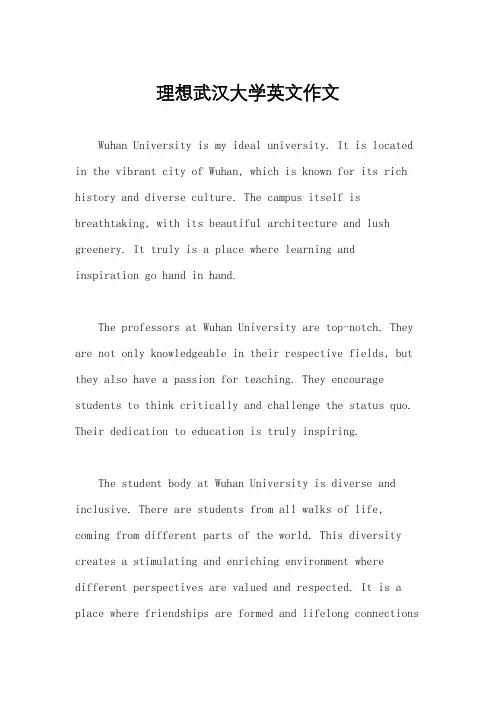
理想武汉大学英文作文Wuhan University is my ideal university. It is located in the vibrant city of Wuhan, which is known for its rich history and diverse culture. The campus itself is breathtaking, with its beautiful architecture and lush greenery. It truly is a place where learning andinspiration go hand in hand.The professors at Wuhan University are top-notch. They are not only knowledgeable in their respective fields, but they also have a passion for teaching. They encourage students to think critically and challenge the status quo. Their dedication to education is truly inspiring.The student body at Wuhan University is diverse and inclusive. There are students from all walks of life, coming from different parts of the world. This diversity creates a stimulating and enriching environment where different perspectives are valued and respected. It is a place where friendships are formed and lifelong connectionsare made.The facilities at Wuhan University are state-of-the-art. The library is a treasure trove of knowledge, with an extensive collection of books and resources. Thelaboratories are equipped with the latest technology, allowing students to engage in hands-on learning experiences. The sports facilities are also impressive, providing students with opportunities to stay active and healthy.One of the things that sets Wuhan University apart isits emphasis on extracurricular activities. There are numerous clubs and organizations that cater to a wide range of interests, from music and art to sports and community service. These activities not only provide students with a chance to pursue their passions, but they also foster teamwork and leadership skills.Living on campus at Wuhan University is an experiencein itself. The dormitories are comfortable and well-maintained, providing students with a home away from home.The campus is lively and bustling, with various events and activities happening all the time. It truly is a vibrant and dynamic community.In conclusion, Wuhan University is my ideal university because of its beautiful campus, dedicated professors, diverse student body, state-of-the-art facilities, emphasis on extracurricular activities, and vibrant campus life. It is a place where I can grow academically, socially, and personally. I believe that attending Wuhan University would be a transformative experience that would prepare me for a successful future.。
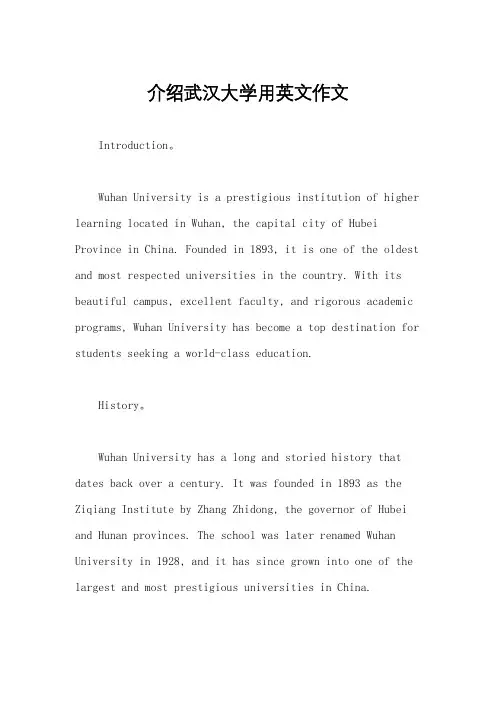
介绍武汉大学用英文作文Introduction。
Wuhan University is a prestigious institution of higher learning located in Wuhan, the capital city of Hubei Province in China. Founded in 1893, it is one of the oldest and most respected universities in the country. With its beautiful campus, excellent faculty, and rigorous academic programs, Wuhan University has become a top destination for students seeking a world-class education.History。
Wuhan University has a long and storied history that dates back over a century. It was founded in 1893 as the Ziqiang Institute by Zhang Zhidong, the governor of Hubei and Hunan provinces. The school was later renamed Wuhan University in 1928, and it has since grown into one of the largest and most prestigious universities in China.Campus。
The Wuhan University campus is located in the Wuchang district of Wuhan, and it covers an area of over 3.5 square kilometers. The campus is divided into four main areas: the Main Campus, the South Lake Campus, the Donghu Campus, and the Tongji Medical College. Each area has its own unique features and facilities, but they are all connected by a network of walkways and bike paths.Academics。
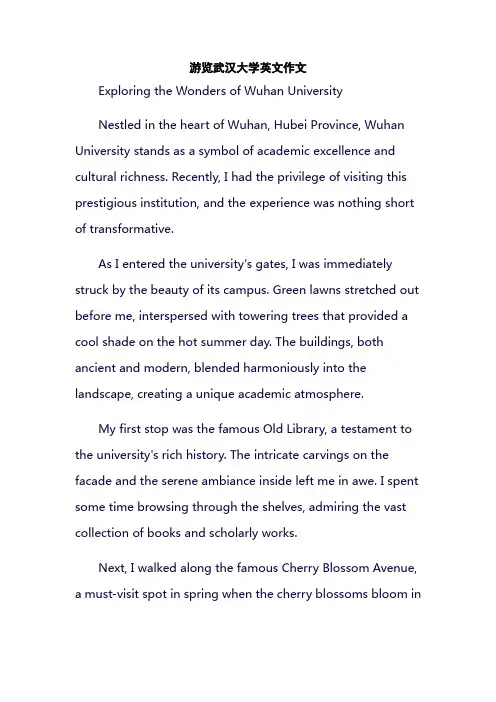
游览武汉大学英文作文Exploring the Wonders of Wuhan UniversityNestled in the heart of Wuhan, Hubei Province, Wuhan University stands as a symbol of academic excellence and cultural richness. Recently, I had the privilege of visiting this prestigious institution, and the experience was nothing short of transformative.As I entered the university's gates, I was immediately struck by the beauty of its campus. Green lawns stretched out before me, interspersed with towering trees that provided a cool shade on the hot summer day. The buildings, both ancient and modern, blended harmoniously into the landscape, creating a unique academic atmosphere.My first stop was the famous Old Library, a testament to the university's rich history. The intricate carvings on the facade and the serene ambiance inside left me in awe. I spent some time browsing through the shelves, admiring the vast collection of books and scholarly works.Next, I walked along the famous Cherry Blossom Avenue, a must-visit spot in spring when the cherry blossoms bloom infull glory. Even in the summer, the avenue retained its charm, with the lush greenery and the occasional tree bearing its fruit.Wandering through the campus, I came across various student groups engaged in various activities. Some were discussing projects in the open spaces, while others were practicing martial arts or playing musical instruments. The vibrant energy and youthful enthusiasm were palpable, giving me a glimpse into the university's vibrant academic culture.I also visited the famous Wuhan University Lakes, where I watched students rowing boats and enjoying the serene surroundings. The lakes added a touch of tranquility to the bustling campus, providing a place for students to unwind and relax.In addition to its academic and cultural offerings, Wuhan University also boasts a variety of amenities for its students. I walked through the bustling student center, admiring the diverse range of shops, cafes, and cultural events. It was clear that the university strives to provide a comprehensive experience for its students, beyond just academics.As I prepared to leave, I took a moment to reflect on my visit. Wuhan University is not just a place of learning; it is acommunity that fosters growth, creativity, and cultural exchange. I am grateful for the opportunity to explore this remarkable institution and look forward to returning again in the future.。
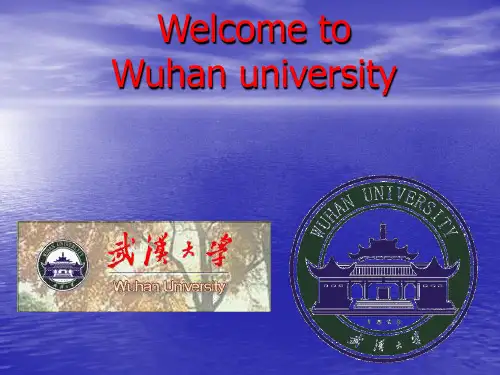
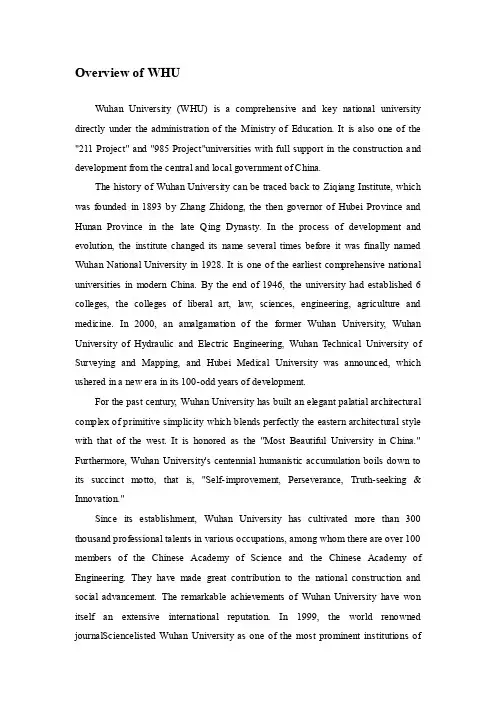
Overview of WHUWuhan University (WHU) is a comprehensive and key national university directly under the administration of the Ministry of Education. It is also one of the "211 Project" and "985 Project"universities with full support in the construction a nd development from the central and local government of China.The history of Wuhan University can be traced back to Ziqiang Institute, which was founded in 1893 by Zhang Zhidong, the then governor of Hubei Province and Hunan Province in the late Qing Dynasty. In the process of development and evolution, the institute changed its name several times before it was finally named Wuhan National University in 1928. It is one of the earliest comprehensive national universities in modern China. By the end of 1946, the university had established 6 colleges, the colleges of liberal art, law, sciences, engineering, agriculture and medicine. In 2000, an amalgamation of the former Wuhan University, Wuhan University of Hydraulic and Electric Engineering, Wuhan Technical University of Surveying and Mapping, and Hubei Medical University was announced, which ushered in a new era in its 100-odd years of development.For the past century, Wuhan University has built an elegant palatial architectural complex of primitive simplicity which blends perfectly the eastern architectural style with that of the west. It is honored as the "Most Beautiful University in China." Furthermore, Wuhan University's centennial humanistic accumulation boils down to its succinct motto, that is, "Self-improvement, Perseverance, Truth-seeking & Innovation."Since its establishment, Wuhan University has cultivated more than 300 thousand professional talents in various occupations, among whom there are over 100 members of the Chinese Academy of Science and the Chinese Academy of Engineering. They have made great contribution to the national construction and social advancement. The remarkable achievements of Wuhan University have won itself an extensive international reputation. In 1999, the world renowned journalSciencelisted Wuhan University as one of the most prominent institutions ofhigher education in China.Burgeoning are the international exchanges and cooperation of Wuhan University in recent years. It has established cooperative relationship with more than 400 universities and research institutes in over 70 countries and regions.Now Wuhan University is endeavoring to shape itself into a world-class comprehensive research university domestically and internationally.Wuhan UniversityHistoryWuhan University is located in Wuhan, Hubei, China, and is administered by the Ministry of Education of China. It was selected by both Project 985 and Project 211 as a major receiver of state funding. The university is situated at Luojia Hill, with palatial buildings blending the Chinese and Western style. It was commonly regarded as one of the most beautiful campuses and top 10 university for decades in China.The university dates back to the Ziqiang Institute, which was founded in 1893 by Zhang Zhidong, governor of Hubei and Hunan Provinces in the late Qing ter, it changed its name several times before it was named National Wuhan University in July 1928, and was among the first group of national universities in modern China. In Feb, 1929, the jurist Wang Shijie became the first president of Wuhan University. During the War of Resistance Against Japan, Wuhan University moved to Leshan, Sichuan Province and returned to Luojia Hill after the war.By the end of 1946, the university had six Faculties: the Faculties of liberal arts, law, sciences, engineering, agriculture and medicine. Wuhan University enjoyed a very high academic status, with Wang Shijie, Wang Xinggong and Zhou Gengsheng as its successive presidents.A number of scholars such as Gu Hongming, Zhu Kezhen, Wu Baoliang, Zha Qian, Gui Zhiting, Y e Y age, Li Siguang, Wen Yiduo, Huang Kan, Yu Dafu, Shen Congwen, Zhu Guangqian, Liu Ze, Liu Y ongji, Y e Shengtao, Y ang Duanliu and Li Jiannong taught here successively. According to the university, in 1948, the Universityof Oxford wrote an official letter to the Ministry of Education of the Chinese National Government, stating that bachelors of liberal arts and sciences that graduated from Wuhan University with average grades above 80 could enjoy "the senior status of Oxford."In 1952, after a general reshuffle of the colleges and departments of the higher educational institutions throughout the country, Wuhan University became a university of liberal arts and sciences directly under the administration of the Ministry of Higher Education.Professor Li Da, Delegate to the First Congress of the Chinese Communist Party and a celebrated philosopher, economist and academician of the Chinese Academy of Sciences, held the post of president of the university for 14 years. The Wuhan University School of Medicine and Tongji University Medical School jointly formed Central-south Tongji Medical College (later Wuhan Medical College), then Tongji Medical University.Mergern August 2, 2000, with the approval of the State Council of the People's Republic of China, the new Wuhan University was established as a combination of four major universities close together ---- the former Wuhan University, the former Wuhan University of Hydraulic and Electrical Engineering (WUHEE), the former Wuhan Technical University of Surveying and Mapping (WTUSM) and the former Hubei Medical University (HBMU).Historical names1893 Ziqiang Institute 自强学堂1902 Foreign Languages Institute 方言学堂1913 The National Wuchang Higher Normal College 国立武昌高等师范学校1923 The National Wuchang Normal University 国立武昌师范大学1924 The National Wuchang University 国立武昌大学1926 The National Wuchang Zhongshan University 国立武昌中山大学1928 National Wuhan University 国立武汉大学1949 (Old) Wuhan University (老) 武汉大学2000 (New) Wuhan University 武汉大学AcademicsIn 2014, Wuhan University's student body consists of 34,131 full-time undergraduates and 13,918 full-time master's degree candidates, 7,477 Ph.D candidates and 1,477 international students.RankingsWorldIn 2014, QS World University Rankings ranked it 335th in the world and 11th regionally. Academic Ranking of World Universities ranked it between 401-500 in the world and 26th in Greater China. It came 351st-400th in the latest Times Higher Education World University Rankings where it ranked 13-14th in mainland China. US News and World Report ranked it 301st in the world and 11th in China.ChinaWuhan University is ranked among the top 10 universities in China. In 2014, CUAA ranked it the 5th in China and Wu Shulian ranked it the 7th. In 2015, CUAA ranked it the 4th in China.Schools and colleges1.College of Chinese Language and Literature (文学院)2.School of History (历史学院)3.School of Philosophy (哲学学院)4.School of Foreign Languages and Literature (外国语言文学学院)5.School of Journalism and Communication (新闻与传播学院)6.Department of Art (艺术学系)7.School of Information Management (信息管理学院)8.School of Economics and Management (经济与管理学院)9.School of Law (法学院)10.School of Political Science and Public Management (政治与公共管理学院)11.College of Education (教育科学学院)12.WTO Studies School (WTO学院)13.Institute for Advanced Study (IAS) (高级研究中心)14.School of Mathematics and Statistics (数学与统计学院)15.School of Physics (物理科学与技术学院)16.College of Chemistry and Molecular Sciences (化学与分子科学学院)17.Wuhan University College of Life Sciences (生命科学学院)]18.School of Resource and Environmental Science (资源与环境科学学院)19.College of Pharmacy (药学院)20.College of Material Science and Engineering (材料科学与工程学院)21.School of Water Resource and Hydropower (水利水电学院)22.School of Electrical Engineering (电气工程学院)23.College of Power and Mechanical Engineering (动力与机械学院)24.School of Urban Design (城市设计学院)25.School of Civil Engineering (土木建筑工程学院)26.School of Computer Science (计算机学院)27.School of Remote Sensing Information Engineering (遥感信息工程学院)28.School of Electronic Information (电子信息学院)29.International School of Software (国际软件学院)30.School of Geodesy and Geomatics (测绘学院)31.School of Printing and Packaging (印刷与包装系)32.School of Medicine (医学院)33.College of Basic Medicine (基础医学院)34.School of Nursing (HOPE护理学院)35.School of Stomatology (口腔医学院)36.School of Public Health (公共卫生学院)37.College of Foreign Students Education (留学生教育学院)38.School of Network Education (网络教育学院)CampusThe university has rolling physical features with the scenic Luojia Hill and the beautiful East Lake. Its campus is heavily wooded and green, with fragrant flowers everywhere year-round. Wuhan University is widely known as one of the most beautiful universities in China, especially for its cherry blossom garden in the spring.A cherry blossom festival is held every spring. Most stylish old buildings were designed by F. H. Kales (1899–1979). Educated in MIT, Mr. Kales was a pioneer to blend western architectural styles with traditional Chinese elements, which is most evident from his roof designs.Wuhan University boasts a campus covering an area of 5508 mu and has a floor area of 2.42 square kilometres. The university's libraries have a collection of approximately 5.4 million volumes and subscriptions to more than 10,000 Chinese and foreign periodicals.CooperationWuhan University has established cooperative relationship with more than 300 universities and research institutes in over 40 countries and regions.Art and cultureLuojia Golden Fall Art FestivalLuojia Golden Fall International Cultural FestivalStudents' Associations Cultural FestivalCampus Supermarket of Cultural ActivitiesNotable alumniGuo Moruo, Chinese author, poet, historian, archaeologist, and government official from Sichuan, China.Shen Congwen, Chinese Writer.Wen Yiduo, Chinese poet and scholar.Li Long Lam, Hong Kong ArchaeologistLi Siguang, the founder of China's geomechanics.Ling Shuhua,Chinese modernist writer whose short stories became popular during the 1920s and 30s.Wan Exiang, professor of international law at Wuhan University, vice president of the Supreme People's Court of China, and vice president of the Revolutionary Committee of the Kuomintang.Su Xuelin, Chinese author and scholar.Xiaokai Y ang, Chinese-Australian economist.Wang Tieya, an eminent Chinese jurist and former Judge of the International Criminal Tribunal for the Former Yugoslavia.Li Haopei, Chinese jurist, diplomat and academic.Chao Y ao-dong, Taiwanese politician, economist and former Minister of Economic Affairs (1981–84).Wu Mi, one of the founders of Chinese comparative literature.Chi Li, contemporary female Chinese writer.Zheng Lihui, a Male Chinese gymnast, was part of the Chinese team that won the gold medal in the team event at the 2000 Summer Olympics in Sydney.Xiao Hailiang, a Chinese diver who became an Olympic champion in the 3m Springboard Synchronized event at the 2000 Summer Olympics.Li Da, Chinese Marxist philosopher.Karim Massimov, Prime Minister of Kazakhstan (2007 – 2012).Lei Jun, Founder of Xiaomi Tech, one of China's largest technology companies.。
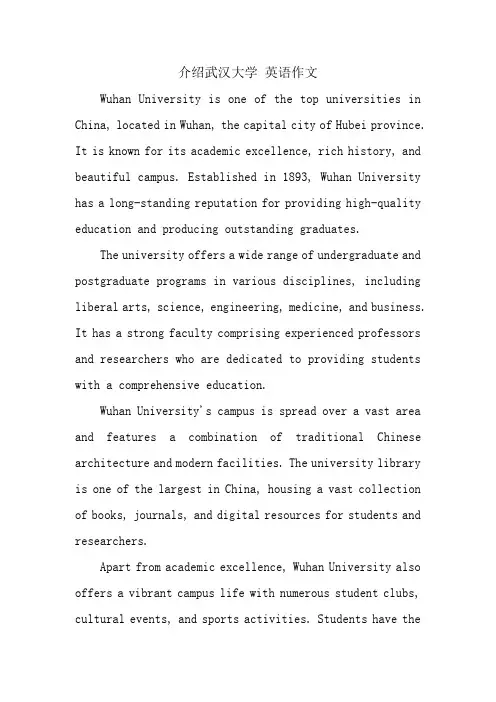
介绍武汉大学英语作文Wuhan University is one of the top universities in China, located in Wuhan, the capital city of Hubei province. It is known for its academic excellence, rich history, and beautiful campus. Established in 1893, Wuhan University has a long-standing reputation for providing high-quality education and producing outstanding graduates.The university offers a wide range of undergraduate and postgraduate programs in various disciplines, including liberal arts, science, engineering, medicine, and business. It has a strong faculty comprising experienced professors and researchers who are dedicated to providing students with a comprehensive education.Wuhan University's campus is spread over a vast area and features a combination of traditional Chinese architecture and modern facilities. The university library is one of the largest in China, housing a vast collection of books, journals, and digital resources for students and researchers.Apart from academic excellence, Wuhan University also offers a vibrant campus life with numerous student clubs, cultural events, and sports activities. Students have theopportunity to engage in extracurricular activities and develop their talents and interests outside of the classroom.In conclusion, Wuhan University is a prestigious institution that provides a well-rounded education and a supportive environment for students to grow and excel. It is a place where academic excellence, cultural richness, and personal development come together to shape the future leaders of tomorrow.中文翻译:武汉大学是中国顶尖的大学之一,位于湖北省省会武汉市。
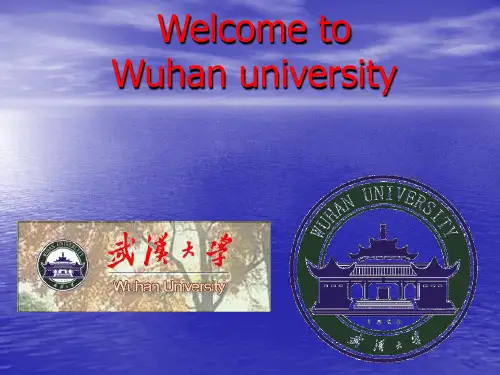
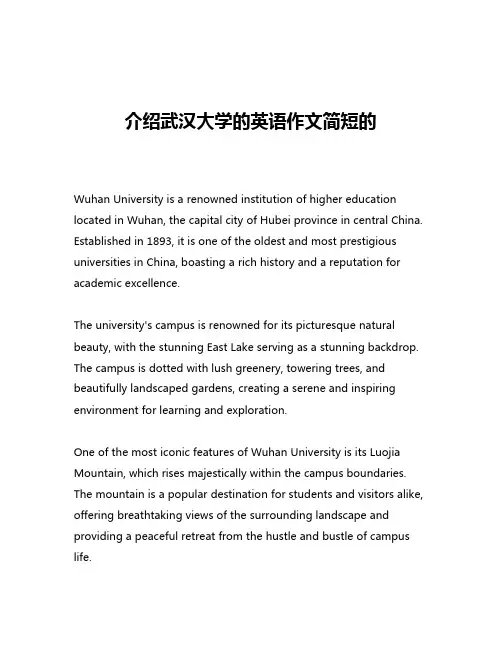
介绍武汉大学的英语作文简短的Wuhan University is a renowned institution of higher education located in Wuhan, the capital city of Hubei province in central China. Established in 1893, it is one of the oldest and most prestigious universities in China, boasting a rich history and a reputation for academic excellence.The university's campus is renowned for its picturesque natural beauty, with the stunning East Lake serving as a stunning backdrop. The campus is dotted with lush greenery, towering trees, and beautifully landscaped gardens, creating a serene and inspiring environment for learning and exploration.One of the most iconic features of Wuhan University is its Luojia Mountain, which rises majestically within the campus boundaries. The mountain is a popular destination for students and visitors alike, offering breathtaking views of the surrounding landscape and providing a peaceful retreat from the hustle and bustle of campus life.The university's academic programs are equally impressive, with a wide range of disciplines spanning the humanities, social sciences, natural sciences, and engineering. Wuhan University is particularly renowned for its strong programs in fields such as law, economics, management, and the natural sciences, attracting top-caliber students and faculty from around the world.The university's commitment to excellence is reflected in its impressive research output, with Wuhan University ranking among the top institutions in China for research productivity and impact. Faculty members at the university are engaged in cutting-edge research across a diverse range of fields, contributing to the advancement of knowledge and the betterment of society.Beyond its academic achievements, Wuhan University is also renowned for its vibrant campus life and rich cultural heritage. The university boasts a thriving student community, with a wide range of student organizations, clubs, and extracurricular activities catering to diverse interests and passions. From sports teams to performing arts groups, Wuhan University offers ample opportunities for students to explore their talents and interests outside the classroom.The university's cultural heritage is equally impressive, with a number of historic buildings and landmarks scattered throughout the campus. The Guanghua Tower, for instance, is a iconic landmark that hasstood as a symbol of Wuhan University for over a century, while the Yue Fei Temple, located within the campus, is a testament to the university's deep-rooted connection to Chinese history and tradition.One of the key strengths of Wuhan University is its commitment to internationalization and global engagement. The university actively seeks to attract students and faculty from around the world, fostering a diverse and inclusive community that celebrates cultural exchange and intellectual collaboration.Through its various exchange programs, joint research initiatives, and international partnerships, Wuhan University has established itself as a hub of global academic and cultural exchange, offering students and faculty the opportunity to engage with their counterparts from across the world.The university's commitment to internationalization is also reflected in its state-of-the-art facilities and infrastructure, which are designed to cater to the needs of a diverse student body. From modern dormitories and dining halls to cutting-edge research laboratories and libraries, Wuhan University provides its students and faculty with the resources and support they need to thrive in a rapidly changing global landscape.Despite its many accolades and achievements, Wuhan Universityremains deeply rooted in its local community, with a strong commitment to social responsibility and community engagement. The university actively collaborates with local organizations and government agencies to address pressing social and environmental challenges, leveraging its expertise and resources to make a positive impact on the lives of those around it.Through its various outreach and service-learning programs, Wuhan University encourages its students to engage with the local community, fostering a sense of civic responsibility and social consciousness that will serve them well in their future endeavors.In conclusion, Wuhan University is a truly remarkable institution of higher education, offering a world-class education, a vibrant campus life, and a rich cultural heritage. With its commitment to academic excellence, global engagement, and social responsibility, Wuhan University stands as a shining example of the transformative power of higher education, inspiring students and faculty alike to strive for greatness and make a lasting impact on the world around them.。
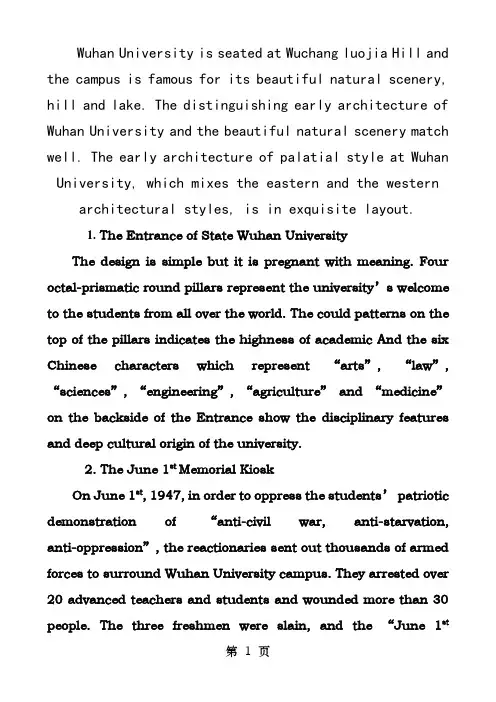
Wuhan University is seated at Wuchang luojia Hill and the campus is famous for its beautiful natural scenery, hill and lake. The distinguishing early architecture of Wuhan University and the beautiful natural scenery match well. The early architecture of palatial style at Wuhan University, which mixes the eastern and the western architectural styles, is in exquisite layout.1.The Entrance of State Wuhan UniversityThe design is simple but it is pregnant with meaning. Four octal-prismatic round pillars represent the university’s welcome to the students from all over the world. The could patterns on the top of the pillars indicates the highness of academic And the six Chinese characters which represent “arts”, “law”, “sciences”, “engineering”, “agriculture”and “medicine”on the backside of the Entrance show the disciplinary features and deep cultural origin of the university.2. The June 1st Memorial KioskOn June 1st, 1947, in order to oppress the students’ patriotic demonstration of “anti-civil war, anti-starvation, anti-oppression”, the reactionaries sent out thousands of armed forces to surround Wuhan University campus. They arrested over 20 advanced teachers and students and wounded more than 30 people. The three freshmen were slain, and the “June 1stMassacre”of Wuhan University shocked the whole world. To memorize them, the kiosk was set up on the campus.3.The Sculpture of Li SiguangIn 1928, 39-year-old Li Siguang lived up to the expectation of educator Cai Yuanpei, worked with other members of the construction committee for the new campus. For the new campus site, Li Siguang and the well-know silviculturist Ye Yage, carrying solid food, and riding on the donkey, searched every place of Wuchang suburban areas.4.The GymnasiumLi Yuanhong(Song Qing), President of the Republic of China in the early years of its founding, wanted to be buried at the southern foot of Luojia Hill after his death. But the university declined. Two sons of Li, bestowed the donation which was kept by their father, and was originally financed for the construction of Jianghan University, upon Wuhan University for the building of gymnasium, thus the gymnasium is also named Song Qing Gymnasium. The once advanced three-fold arched steel structure, large span space, unique fastigium and housetop are applied to the construction of the gymnasium.5.The Kunpeng SquareThe sculpture is given to Wuhan University as a present by the 81st and 82nd students graduated from this university. Kunpeng isan animal in Chinese fairly tale. In the North Sea, there’s a huge fish called “Kun”. As it swims, the water under its fin splashes 3,000 miles high. When it changes into a bird, it is called “Peng”, which can fly in the cloud of 90,000 miles high.6.The Cherry blossomIn 1938, Wuhan was occupied by the Japanese invaders. Luojia Hill became the central headquarter and field hospital of Japanese army in Central China. It is not until eight years later that Anti-Japanese War ended in victory for us. The first cherry blossom was planted by the Japanese. However, as the florescence of cherry blossom is twenty to thirty years, the cherry blossoms now are absolutely not the original ones. A professor of Wuhan University has kept a record of the various data of cherry blossom for 60 years, which is even earlier than Japanese.7. The Students’ DormitoryThe four dormitories are connected with Roman arches. Built along the southern slope of Lion Hill, it is skillfully designed. Different hierarchical rooms are built in different height along the altitude, with the base in different height and the top on the same plane. That is, “uneven base, even roof”. This design is pregnant with profound meanings.8. The LibraryThe library is the highest building on Lion Hill. It’s thelandmark and spiritual symbol of Wuhan University. The integrate appearance of the library is of traditional Chinese palatial architecture. It is designed by an American architect, Mr.F.H.Kales. What a surprise! On the top is erected seven-ring tripod, with heating chimney installed on the roof. The reinforced concrete framed structure and combined steel rack for the bearing was adopted in structural technology. On the ridge, ring corridor, and eaves are delicate ornaments of entwining dragons, cloudings, bucket arches, fairies and animals. It’s the knowledge treasury and academic status as well as a significant site for visitors.9. College of Liberal Arts and School of LawThe two buildings are respectively situated on the two sides of Library. Their eaves are special. The southern-style eaves, lively and pretty, respond to the northern-style ones, flat and gentle. The roof of the building of College of Liberal Arts takes upturned angles, signifying the literary talent upturning. While the flat and gentle roof of the building of School of Law implying integrity of legal principles and strict execution of law.10. College of EngineeringThe building style of College of Engineering combines the style of European architecture and that of ancient Chinese architecture. Its huge glass-dome with double-eaved roofs on the four sides matches the four attached buildings with gable-and-hip roof andthe two Roman-style watchtowers in front of them. The inside winding corridor of the principle building is the “shared space”which is five-story in height. It uses steel structure and transparent glass-roof to form a bright glass atrium in large public architecture becomes popular in foreign architecture circle only after 1960s.11. College of ScienceThe dome of the principle building echoes what the glass-dome of College of Engineering, since one id round and the other is square.The inner structure is quite exquisite and practical. Taking advantage of the slope of the hill, the two lecture halls in the principal building need not to be installed with sound equipment. The round pillars in the lecture halls, with the white patterns at the top, are solemn and elegant.。
图2 系统架构图HTC Vive则是一款应用面非常广泛的虚拟现实头戴式显示器,其配备了一个头戴显示器,两个单手持控制器,一个同时追踪显示器与控制器的定位系统,三部分共同为用户提供沉浸图3 数据及命令流向图1.2 基于VR技术的机器人交互式仿真运动系统功能阐述本系统采用了三款机械手臂,分别设置了三个不同的场景,让使用者执行功能性不同的操作命令,让机器人能够在多种工作环境中进行仿真运动。
(1)目标打点行进本场景采用了KR16六轴机械臂,使用者可以通过Vive手柄直观地在空中进行“打点”操作,即将手柄前端顶点在空间中的位置坐标设置为机械臂末端的目标位置。
使用者可以在虚拟空间中进行单点或多点目标点设定工作,当使用者在虚拟进行打点操作后,目标点的坐标参数会由Unity反馈到V-rep系统中,由V-rep进行机器人运动路径计算。
由于KR机械臂自身运动范围的限制,如果产生机械臂末端无法到达的目标点时,V-rep系统则会发送相应的反馈信息,在Unity 场景中该点会产生区别于可到达点的颜色变化,以示意使用者此点机械臂无法到达。
而其他可到达的目标点,通过V-rep的运动变化,虚拟场景中也会随之产生相同的仿真运动。
图4 目标打点行进场景流程图图5 目标打点行进场景示意图(2)自主抓取目标UR10机器人的抓取端坐标与使用者控制HTC Vive的一只手柄所处空间坐标绑定,当使用者在空间中移动手柄时,Unity将此时的手柄坐标参数反馈给V-rep系统中进行运动路径计算,通过各关节之间的扭转使机械臂抓取端达到相应位置。
在的模型变换也实时反馈到Unity场景中,再通过Unity反馈到使用者所佩戴的虚拟现实头盔,观察到整个机械臂的运动变换我们在Unity中将UR10机械臂的抓取端和要抓取的目标增加了碰撞检测,当机械臂随着使用者控制的手柄到达相应位置时,检测到机械臂抓取端与抓取目标产生了碰撞,则说明机械臂已经达到了使用者所需要达到的位置点,当使用者一直按住抓取键时,抓取目标也会随抓取端的位置改变也改变,直到用户松开抓取键时掉落。
介绍武汉大学英语作文English: Wuhan University, located in the bustling city of Wuhan in central China, is one of the most prestigious and comprehensive universities in the country. With a history dating back more than 120 years, it has developed into a world-renowned institution known for its academic excellence and beautiful campus. The university offers a wide range of academic programs in various disciplines, including humanities, sciences, engineering, and medicine, attracting students from all over the country and the world. The campus itself is a blend of traditional Chinese architecture and modern facilities, creating a vibrant and dynamic environment for learning and research. The university is also known for its strong emphasis on research and innovation, with numerous research centers and laboratories dedicated to advancing knowledge in various fields. With a strong commitment to fostering global perspectives and cross-cultural understanding, Wuhan University has established partnerships with various universities and institutions around the world, offering students rich opportunities for international exchange and collaboration.Translated content: 位于中国中部繁华城市武汉的武汉大学是该国最负盛名且最全面的大学之一。
武汉大学英文作文Wuhan University is one of the most prestigious universities in China. Its beautiful campus and rich academic resources make it an ideal place for students to pursue their dreams. The campus is always bustling with activities, ranging from academic lectures to sports competitions. The students here are not only diligent in their studies, but also passionate about extracurricular activities.The professors at Wuhan University are highly knowledgeable and experienced in their respective fields. They are always willing to help students with their academic difficulties and provide guidance for their future career paths. The academic atmosphere on campus is vibrant, with students engaging in lively discussions and debates in classrooms and study groups. The university also organizes various academic conferences and seminars, inviting scholars from around the world to share their research findings.Apart from academic pursuits, Wuhan University also offers a wide range of extracurricular activities for students to explore their interests and talents. There are numerous student clubs and organizations, covering areas such as music, dance, sports, and volunteer work. These activities not only provide students with opportunities to relax and unwind, but also foster their personal growth and leadership skills.The campus life at Wuhan University is vibrant and diverse. Students from different backgrounds and cultures come together, creating a multicultural environment. This diversity not only enriches the learning experience, but also promotes understanding and tolerance among students. The university also organizes cultural events and festivals, allowing students to showcase their talents and traditions.The facilities at Wuhan University are top-notch, providing students with a comfortable and convenient living and learning environment. The library is well-stocked witha wide range of books and resources, catering to the needsof students from various disciplines. The sports facilities are also impressive, with well-equipped gyms and sports fields for students to engage in physical activities.In conclusion, Wuhan University offers a vibrant and diverse campus life, with excellent academic resources and a wide range of extracurricular activities. It is a place where students can pursue their passions and dreams, while also developing their personal and professional skills. Whether it is in the classroom, on the sports field, or in the cultural events, Wuhan University provides a nurturing environment for students to thrive and succeed.。
武汉大学简介Wuhan University, located in the beautiful city of Wuhan, Hubei Province, is one of the oldest and most prestigious institutions of higher learning in China. With a rich historical heritage dating back to the late 19th century, it has evolved into a comprehensive research university renowned for its academic excellence and diverse cultural offerings.The campus of Wuhan University is a masterpiece of landscape design, blending natural beauty witharchitectural elegance. Green lawns, shady trees, and picturesque lakes create a serene and inspiring academic environment. The cherry blossoms in spring attract countless visitors from all over the country, making the campus a popular tourist destination as well.Academically, Wuhan University boasts a wide range of disciplines, including humanities, social sciences, natural sciences, engineering, and medicine. It has a strongfaculty of renowned scholars and researchers who are actively engaged in cutting-edge research and teaching. The university is also known for its innovative educationalpractices, such as the implementation of credit-based teaching and the promotion of interdisciplinary collaboration.In addition to its academic pursuits, Wuhan University places great emphasis on cultural exchange andinternational cooperation. It has established partnerships with numerous universities and research institutions worldwide, providing its students and faculty with valuable opportunities for international study and collaboration. The university also hosts a variety of cultural events and festivals, fostering a vibrant and diverse cultural atmosphere.Moreover, Wuhan University is committed to serving the community and promoting social progress. Its research efforts often focus on addressing real-world problems and contributing to societal development. The university also encourages its students to engage in volunteer work and community service, fostering a sense of responsibility and citizenship.In conclusion, Wuhan University is a prestigious institution of higher learning that offers its students arich academic experience, a beautiful campus environment, and numerous opportunities for cultural exchange and personal growth. It is a place where tradition andinnovation coexist, where knowledge and wisdom are nurtured, and where dreams are realized.**武汉大学简介**武汉大学坐落于美丽的湖北省武汉市,是中国最古老、最负盛名的高等学府之一。
O v e r v i e w o f W H UWuhan University (WHU) is a comprehensive and key national university directly under the administration of the Ministry of Education. It is also one of the "211 Project" and "985 Project"universities with full support in the construction and development from the central and local government of China.The history of Wuhan University can be traced back to Ziqiang Institute, which was founded in 1893 by Zhang Zhidong, the then governor of Hubei Province and Hunan Province in the late Qing Dynasty. In the process of development and evolution, the institute changed its name several times before it was finally named Wuhan National University in 1928. It is one of the earliest comprehensive national universities in modern China. By the end of 1946, the university had established 6 colleges, the colleges of liberal art, law, sciences, engineering, agriculture and medicine. In 2000, an amalgamation of the former Wuhan University, Wuhan University of Hydraulic and Electric Engineering, Wuhan Technical University of Surveying and Mapping, and Hubei Medical University was announced, which ushered in a new era in its 100-odd years of development.For the past century, Wuhan University has built an elegant palatial architectural complex of primitive simplicity which blends perfectly the eastern architectural style with that of the west. It is honored as the "Most Beautiful University in China." Furthermore, Wuhan University's centennial humanistic accumulation boils down to its succinct motto, that is, "Self-improvement, Perseverance, Truth-seeking & Innovation."Since its establishment, Wuhan University has cultivated more than 300 thousand professional talents in various occupations, among whom there are over 100 members of the Chinese Academy of Science and the Chinese Academy of Engineering. They have made great contribution to the national construction and social advancement. The remarkable achievements of Wuhan University have won itself an extensive international reputation. In 1999, the world renowned journalSciencelisted Wuhan University as one of the most prominent institutions of higher education in China.Burgeoning are the international exchanges and cooperation of Wuhan University in recent years. It has established cooperative relationship with more than 400 universities and research institutes in over 70 countries and regions.Now Wuhan University is endeavoring to shape itself into a world-class comprehensive research university domestically and internationally.Wuhan UniversityHistoryWuhan University is located in Wuhan, Hubei, China, and is administered by the Ministry of Education of China. It was selected by both Project 985 and Project 211 as a major receiver of state funding. The university is situated at Luojia Hill, with palatial buildings blending the Chinese and Western style. It was commonly regarded as one of the most beautiful campuses and top 10 university for decades in China.The university dates back to the Ziqiang Institute, which was founded in 1893 by Zhang Zhidong, governor of Hubei and Hunan Provinces in the late Qing , it changed its name several times before it was named National Wuhan University in July 1928, and was among the first group of national universities in modern China. In Feb, 1929, the jurist Wang Shijie became the first president of Wuhan University. During the War of Resistance Against Japan, Wuhan University moved to Leshan, Sichuan Province and returned to Luojia Hill after the war.By the end of 1946, the university had six Faculties: the Faculties of liberal arts, law, sciences, engineering, agriculture and medicine. Wuhan University enjoyed a very high academic status, with Wang Shijie, Wang Xinggong and Zhou Gengsheng as its successive presidents.A number of scholars such as Gu Hongming, Zhu Kezhen, Wu Baoliang, Zha Qian, Gui Zhiting, Ye Yage, Li Siguang, Wen Yiduo, Huang Kan, Yu Dafu, Shen Congwen, Zhu Guangqian, Liu Ze, Liu Yongji, Ye Shengtao, Yang Duanliu and Li Jiannong taught here successively. According to the university, in 1948, the University of Oxford wrote an official letter to the Ministry of Education of the Chinese National Government, stating that bachelors of liberal arts and sciences that graduated from Wuhan University with average grades above 80 could enjoy "the senior status of Oxford."In 1952, after a general reshuffle of the colleges and departments of the higher educational institutions throughout the country, Wuhan University became a university of liberal arts and sciences directly under the administration of the Ministry of Higher Li Da, Delegate to the First Congress of the Chinese Communist Party and a celebrated philosopher, economist and academician of the Chinese Academy of Sciences, held the post of president of the university for 14 years. The Wuhan University School of Medicine and Tongji University Medical School jointly formed Central-south Tongji Medical College (later Wuhan Medical College), then Tongji Medical University.Mergern August 2, 2000, with the approval of the State Council of the People's Republic of China, the new Wuhan University was established as a combination of four major universities close together ---- the former Wuhan University, the former Wuhan University of Hydraulic and Electrical Engineering (WUHEE), the former Wuhan Technical University of Surveying and Mapping (WTUSM) and the former Hubei Medical University (HBMU).Historical names1893 Ziqiang Institute 自强学堂1902 Foreign Languages Institute 方言学堂1913 The National Wuchang Higher Normal College 国立武昌高等师范学校1923 The National Wuchang Normal University 国立武昌师范大学1924 The National Wuchang University 国立武昌大学1926 The National Wuchang Zhongshan University 国立武昌中山大学1928 National Wuhan University 国立武汉大学1949 (Old) Wuhan University (老) 武汉大学2000 (New) Wuhan University 武汉大学AcademicsIn 2014, Wuhan University's student body consists of 34,131 full-time undergraduates and 13,918 full-time master's degree candidates, 7,477 candidates and 1,477 international students.RankingsWorldIn 2014, QS World University Rankings ranked it 335th in the world and 11th regionally. Academic Ranking of World Universities ranked it between 401-500 in the world and 26th in Greater China. It came 351st-400th in the latest Times Higher Education World University Rankings where it ranked 13-14th in mainland China. US News and World Report ranked it 301st in the world and 11th in China.ChinaWuhan University is ranked among the top 10 universities in China. In 2014, CUAA ranked it the 5th in China and Wu Shulian ranked it the 7th. In 2015, CUAA ranked it the 4th in China.Schools and collegesof Chinese Language and Literature (文学院)of History (历史学院)of Philosophy (哲学学院)of Foreign Languages and Literature (外国语言文学学院)of Journalism and Communication (新闻与传播学院)of Art (艺术学系)of Information Management (信息管理学院)of Economics and Management (经济与管理学院)of Law (法学院)of Political Science and Public Management (政治与公共管理学院)of Education (教育科学学院)Studies School (WTO学院)for Advanced Study (IAS) (高级研究中心)of Mathematics and Statistics (数学与统计学院)of Physics (物理科学与技术学院)of Chemistry and Molecular Sciences (化学与分子科学学院)University College of Life Sciences (生命科学学院)]of Resource and Environmental Science (资源与环境科学学院)of Pharmacy (药学院)of Material Science and Engineering (材料科学与工程学院)of Water Resource and Hydropower (水利水电学院)of Electrical Engineering (电气工程学院)of Power and Mechanical Engineering (动力与机械学院)of Urban Design (城市设计学院)of Civil Engineering (土木建筑工程学院)of Computer Science (计算机学院)of Remote Sensing Information Engineering (遥感信息工程学院)of Electronic Information (电子信息学院)School of Software (国际软件学院)of Geodesy and Geomatics (测绘学院)of Printing and Packaging (印刷与包装系)of Medicine (医学院)of Basic Medicine (基础医学院)of Nursing (HOPE护理学院)of Stomatology (口腔医学院)of Public Health (公共卫生学院)of Foreign Students Education (留学生教育学院)of Network Education (网络教育学院)CampusThe university has rolling physical features with the scenic Luojia Hill and the beautiful East Lake. Its campus is heavily wooded and green, with fragrant flowers everywhereyear-round. Wuhan University is widely known as one of the most beautiful universities in China, especially for its cherry blossom garden in the spring. A cherry blossom festival is held every spring. Most stylish old buildings were designed by F. H. Kales (1899–1979). Educated in MIT, Mr. Kales was a pioneer to blend western architectural styles with traditional Chinese elements, which is most evident from his roof designs.Wuhan University boasts a campus covering an area of 5508 mu and has a floor area of square kilometres. The university's libraries have a collection of approximately million volumes and subscriptions to more than 10,000 Chinese and foreign periodicals. CooperationWuhan University has established cooperative relationship with more than 300 universities and research institutes in over 40 countries and regions.Art and cultureLuojia Golden Fall Art FestivalLuojia Golden Fall International Cultural FestivalStudents' Associations Cultural FestivalCampus Supermarket of Cultural ActivitiesNotable alumniGuo Moruo, Chinese author, poet, historian, archaeologist, and government official from Sichuan, China.Shen Congwen, Chinese Writer.Wen Yiduo, Chinese poet and scholar.Li Long Lam, Hong Kong ArchaeologistLi Siguang, the founder of China's geomechanics.Ling Shuhua,Chinese modernist writer whose short stories became popular during the 1920s and 30s.Wan Exiang, professor of international law at Wuhan University, vice president of the Supreme People's Court of China, and vice president of the Revolutionary Committee of the Kuomintang.Su Xuelin, Chinese author and scholar.Xiaokai Yang, Chinese-Australian economist.Wang Tieya, an eminent Chinese jurist and former Judge of the International Criminal Tribunal for the Former Yugoslavia.Li Haopei, Chinese jurist, diplomat and academic.Chao Yao-dong, Taiwanese politician, economist and former Minister of Economic Affairs (1981–84).Wu Mi, one of the founders of Chinese comparative literature.Chi Li, contemporary female Chinese writer.Zheng Lihui, a Male Chinese gymnast, was part of the Chinese team that won the gold medal in the team event at the 2000 Summer Olympics in Sydney.Xiao Hailiang, a Chinese diver who became an Olympic champion in the 3m Springboard Synchronized event at the 2000 Summer Olympics.Li Da, Chinese Marxist philosopher.Karim Massimov, Prime Minister of Kazakhstan (2007 – 2012).Lei Jun, Founder of Xiaomi Tech, one of China's largest technology companies.。